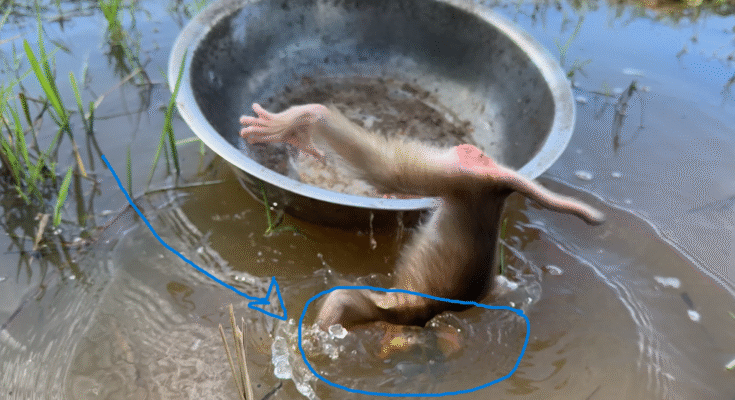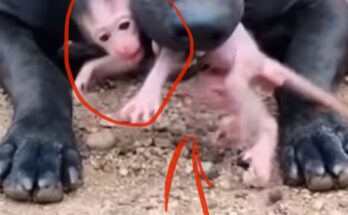In the heart of a lush forest, where sunlight dances between leaves and the sounds of the wild echo through the trees, lived a baby monkey named Miko. Barely a few months old, Miko had yet to learn the world beyond his mother’s arms. But his story is not one of playful adventure—it is one of tragedy, loss, and an untimely end that left an ache in the hearts of those who witnessed it.
Miko was born into a close-knit troop of macaques near a forest lake, a serene body of water where the monkeys would often gather to drink, forage, and rest. His mother, Aya, was a gentle and protective presence. Wherever she went, Miko clung to her fur tightly, occasionally peeking out with curious eyes that hadn’t yet seen the harshness of the world.
But one day, everything changed.
While foraging near the lake’s edge, the troop was startled by a sudden disturbance—possibly a predator, perhaps a territorial conflict with another group. In the chaos, Aya was separated from Miko. Desperate to reach her infant, she tried to return, but in a cruel twist of fate, she was caught in a skirmish and fatally injured.
Miko waited. For hours, he clung to the branch where he last saw her. Troop members, confused and distressed, eventually moved on. But Miko stayed, unaware that his mother would never return.
In the days that followed, the baby monkey’s cries echoed through the trees. He wandered, weak and disoriented, often returning to the lakeside where he last felt his mother’s warmth. He tried to climb trees, but without guidance, he would fall. Other monkeys ignored him, as is often the case in wild animal groups where survival instincts prevail over empathy.
One particularly hot afternoon, Miko approached the lake to drink. Dehydrated and exhausted, he leaned too far. His tiny body lost balance, and he slipped into the water. Monkeys can swim, but Miko was too young—too weak. He struggled, panicked, and finally, the ripples on the lake stilled.
His small body was later found by a wildlife photographer who had been tracking the troop. The image of the lifeless baby cradled by the lake—eyes closed, limbs still—went viral, not for shock value but because it symbolized something deeper: the often unseen pain of wild creatures.
Miko’s story reminds us that nature, while beautiful, is also unforgiving. Every animal, no matter how small, has emotions, bonds, and stories. His brief life touched many hearts, sparking conversations about animal empathy, the emotional intelligence of primates, and the need to treat all creatures with compassion and respect.
While his end was sorrowful, Miko’s legacy lives on—not as a statistic, but as a soul who felt love, loss, and longing. And perhaps that, above all, is the reminder we need in a world so quick to forget the silent stories of the wild.



